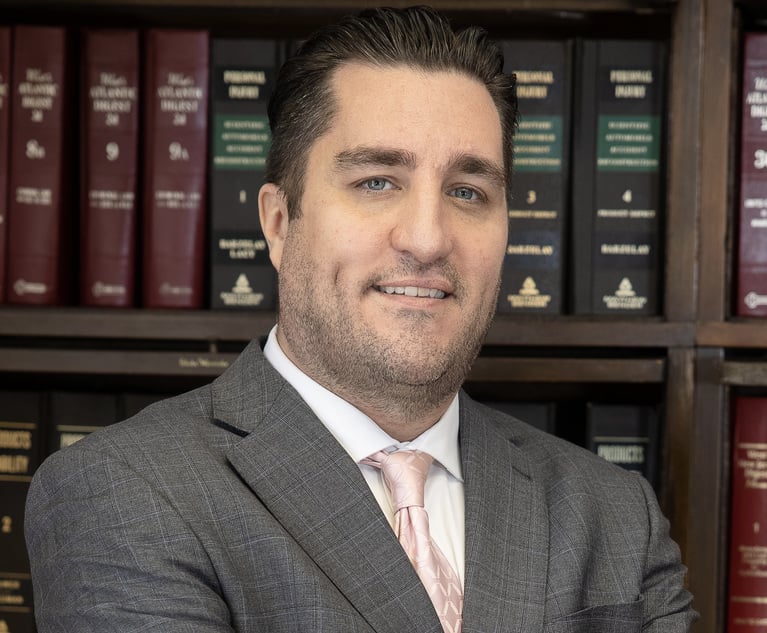Judge Orders Ex-Valeant CEO to Arbitrate Stock Option Suit
The former CEO of Valeant Pharmaceuticals has been ordered to submit to binding arbitration his dispute with the company over allegedly unpaid stock options.
December 22, 2017 at 03:05 PM
4 minute read

The former CEO of Valeant Pharmaceuticals has been ordered to submit to binding arbitration his dispute with the company over allegedly unpaid stock options.
J. Michael Pearson, who left the company after eight years in May 2016, claimed in a suit that the arbitration clause in his 2015 employment agreement was superseded by terms of his separation agreement, which did not require arbitration.
But U.S. District Judge Brian Martinotti ruled Wednesday that an arbitration provision in a prior agreement is superseded by a later agreement without an arbitration provision only if the subsequent agreement contains “an unambiguous complete integration or merger clause.”
Pearson says in his suit that the company made good on its promise to pay him a $9 million severance payment and some other terms. Valeant also provided and indicated that it will continue to provide him with health insurance coverage, office space, an administrative assistant and IT support, according to Pearson. But the company failed to honor its obligation to deliver his vested shares of company stock, which were due to him in November 2016, Pearson asserts in his suit. He says the company owes him over 3 million company shares, which have a value of $64 million based on Friday's stock price of $21.28 per share. His suit also says he is owed a $180,000 consulting fee.
Pearson said the company recently “has made an abrupt decision simply to stop honoring its full obligations, without even attempting to articulate any legal or factual basis for its sudden change of course.”
According to Pearson's suit, Valeant General Counsel Christina Ackermann told him “the board has reviewed the matter and determined that the shares will not be released to Mike Pearson due to the circumstances that Valeant finds itself in at this time.”
And another, unidentified attorney for Valeant told Pearson in a letter, “Valeant believes it would be inappropriate or inequitable in the current environment for Mr. Pearson to receive additional compensation—to the tune of millions of dollars—at a time when countless other Valeant employees have been asked to sacrifice for the good of the company and its shareholders.”
Pearson's separation agreement does not completely supersede his employment agreement, but merely “supersedes any other written or oral promises concerning the subject matter of the separation agreement,” Martinotti said. The subject matter of the 2015 arbitration agreement is different from that of the separation agreement, he said. Arbitration is beyond the subject matter of the separation agreement, and the arbitration provision of the 2015 employment agreement survives, Martinotti said.
Pearson cited several cases where separation agreements were found to have completely superseded employment agreements, but those cases were not applicable because the separation agreements in question contained language stating explicitly that they completely superseded the employment agreements, Martinotti said.
“There is no clear and convincing evidence that the parties chose to seek relief in a different forum. A review of the separation agreement clearly demonstrates it only intended to supersede 'any other written or oral promises concerning the subject matter of this Agreement,'” Martinotti said.
“The parties unambiguously contracted to save the arbitration clause when they decided not to draft a complete merger clause. The parties chose to include the limiting phrase 'concerning the subject matter of this Agreement,' and the Court cannot and will not ignore it,” Martinotti said.
Pearson departed as Valeant, a Canadian company with U.S. headquarters in Bridgewater, New Jersey, became the focus of investigations by Congress, U.S. attorneys in Massachusetts and New York, and the U.S. Securities and Exchange Commission, which have damaged the company's share price, according to the New York Times. Under Pearson, the company was drawn into controversies for its practice of acquiring drugs from other companies and sharply increasing their prices.
Jyotin Hamid of Debevoise & Plimpton in New York, representing Pearson, declined to comment on the ruling. Pearson is also represented by Blank Rome in Princeton, New Jersey.
The lawyers for Valeant, John Bennett of Jackson Lewis in Morristown, New Jersey, and Paul Spagnoletti and Andrew Ditchfield of Davis Polk & Wardwell in New York, did not return calls about the case.
This content has been archived. It is available through our partners, LexisNexis® and Bloomberg Law.
To view this content, please continue to their sites.
Not a Lexis Subscriber?
Subscribe Now
Not a Bloomberg Law Subscriber?
Subscribe Now
NOT FOR REPRINT
© 2025 ALM Global, LLC, All Rights Reserved. Request academic re-use from www.copyright.com. All other uses, submit a request to [email protected]. For more information visit Asset & Logo Licensing.
You Might Like
View All
An Overview of Proposed Changes to the Federal Rules of Procedure Relating to the Expansion of Remote Trial Testimony
15 minute read
Appellate Division Rejects Third Circuit Interpretation of NJ Law, Says No Arbitration for Insurance Fraud
4 minute read

'Go 12 Rounds' or Settle: Rear-End Collision Leads to $2.25M Presuit Settlement
Trending Stories
Who Got The Work
J. Brugh Lower of Gibbons has entered an appearance for industrial equipment supplier Devco Corporation in a pending trademark infringement lawsuit. The suit, accusing the defendant of selling knock-off Graco products, was filed Dec. 18 in New Jersey District Court by Rivkin Radler on behalf of Graco Inc. and Graco Minnesota. The case, assigned to U.S. District Judge Zahid N. Quraishi, is 3:24-cv-11294, Graco Inc. et al v. Devco Corporation.
Who Got The Work
Rebecca Maller-Stein and Kent A. Yalowitz of Arnold & Porter Kaye Scholer have entered their appearances for Hanaco Venture Capital and its executives, Lior Prosor and David Frankel, in a pending securities lawsuit. The action, filed on Dec. 24 in New York Southern District Court by Zell, Aron & Co. on behalf of Goldeneye Advisors, accuses the defendants of negligently and fraudulently managing the plaintiff's $1 million investment. The case, assigned to U.S. District Judge Vernon S. Broderick, is 1:24-cv-09918, Goldeneye Advisors, LLC v. Hanaco Venture Capital, Ltd. et al.
Who Got The Work
Attorneys from A&O Shearman has stepped in as defense counsel for Toronto-Dominion Bank and other defendants in a pending securities class action. The suit, filed Dec. 11 in New York Southern District Court by Bleichmar Fonti & Auld, accuses the defendants of concealing the bank's 'pervasive' deficiencies in regards to its compliance with the Bank Secrecy Act and the quality of its anti-money laundering controls. The case, assigned to U.S. District Judge Arun Subramanian, is 1:24-cv-09445, Gonzalez v. The Toronto-Dominion Bank et al.
Who Got The Work
Crown Castle International, a Pennsylvania company providing shared communications infrastructure, has turned to Luke D. Wolf of Gordon Rees Scully Mansukhani to fend off a pending breach-of-contract lawsuit. The court action, filed Nov. 25 in Michigan Eastern District Court by Hooper Hathaway PC on behalf of The Town Residences LLC, accuses Crown Castle of failing to transfer approximately $30,000 in utility payments from T-Mobile in breach of a roof-top lease and assignment agreement. The case, assigned to U.S. District Judge Susan K. Declercq, is 2:24-cv-13131, The Town Residences LLC v. T-Mobile US, Inc. et al.
Who Got The Work
Wilfred P. Coronato and Daniel M. Schwartz of McCarter & English have stepped in as defense counsel to Electrolux Home Products Inc. in a pending product liability lawsuit. The court action, filed Nov. 26 in New York Eastern District Court by Poulos Lopiccolo PC and Nagel Rice LLP on behalf of David Stern, alleges that the defendant's refrigerators’ drawers and shelving repeatedly break and fall apart within months after purchase. The case, assigned to U.S. District Judge Joan M. Azrack, is 2:24-cv-08204, Stern v. Electrolux Home Products, Inc.
Featured Firms
Law Offices of Gary Martin Hays & Associates, P.C.
(470) 294-1674
Law Offices of Mark E. Salomone
(857) 444-6468
Smith & Hassler
(713) 739-1250






